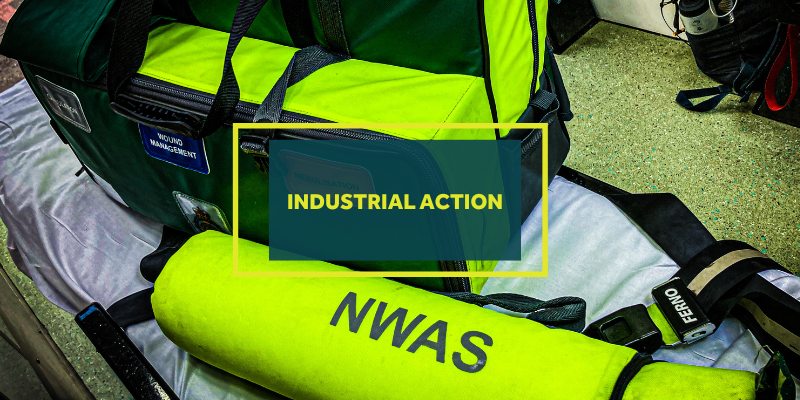
Specifically, members of Unite and Unison will strike on Monday, 23 January, with colleagues from GMB taking industrial action on Tuesday the 24th.
This will see NWAS resources will be severely restricted on both days – and therefore, we are renewing our call to the public only to call us in life-threatening emergencies.
We will have ambulances available – but they will be limited, and we want them to be ready for the patients in most desperate need.
Typical emergencies include cardiac arrest, loss of consciousness, fits that aren’t stopping, breathing difficulties, severe bleeding or allergic reactions and serious head injuries.
On the days of strike, other patients requiring hospital treatment will likely be asked to take alternative transport, such as a taxi or get a lift from family or friends, and there may be delays. For non-urgent health concerns, people should use 111.nhs.uk, their GP or their local pharmacy for help.
In addition, our 999 and 111 call centres will also have fewer staff and be stretched. Therefore, we are asking you not repeatedly call us asking for updates on where your ambulance is. Please only call back if your condition has worsened or to cancel the ambulance. We need to keep lines free for other emergencies.
Patients using the Patient Transport Service (PTS) on the 23rd and 24th may also be affected. Transport will only remain available for renal, oncology and palliative care appointments. Providers will be in touch to inform you if your appointment is being cancelled or to advise if you need to seek alternative transport.
Ged Blezard, Director of Operations, said, “We have been really well supported by the public on the previous two days affected by strikes. However, we understand that anxiety these days can affect people concerned about their health.
“While we hope for a swift resolution to the dispute. This is an issue between the trade unions and the Government in relation to pay, and we respect members’ right to strike.”
“Be assured that if you really need us, please continue to call 999, and we will come as quickly as possible. As before, we are maximising our own resources, using private providers and military support where appropriate and working closely with our trade unions to provide cover for the most serious emergencies. We are also working with our healthcare partners to maintain patient safety during these periods of industrial action.
“But, ultimately, to get to the people who need us this time, we need people to use us wisely.
“Only call 999 in a life-threatening emergency, and if you need urgent care – first use the symptom checker at NHS 111 online, which will direct you to the most appropriate support. Again, you should call on friends or relatives for transport if necessary.”
NHS 111 Online can tell you:
- Where to get help for your symptoms, if you’re not sure what to do
- How to find general health information and advice
- Where to get an emergency supply of your prescribed medicine
- How to get a repeat prescription
More information about when to call 999 and when to go to A&E is available via the national NHS website.
If you are calling us about a mental health concern, please use the mental health crisis lines available in your area:
Greater Manchester (Bury, Heywood, Middleton & Rochdale, Oldham, Stockport and Tameside & Glossop – 0800 014 9995)
Greater Manchester (Bolton, Manchester, Salford, Trafford & Wigan)- 0800 953 0285
Lancashire and South Cumbria – 0800 953 0110
North Cumbria 0800 652 2865
Cheshire and Wirral – 0800 145 6485
Liverpool or Sefton- 0800 145 6570
Halton, St Helens, Warrington and Knowsley – 0800 051 1508
ENDS
NOTES:
Unite and GMB are holding 24 hours walkouts on the 23rd and 24th of January, respectively. Unison is striking between 1000 and 2300 on 23 January.